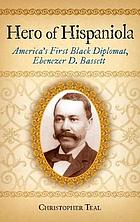This post was written by Abigail Haley, Global Communication Fellow at Meridian. It is the first part in a series of blog posts highlighting and acknowledging the work and contributions of Black diplomats during Black History Month.
Ebenezer Don Carlos Bassett was born a free Black man on October 16,1833, in Connecticut. His father had fled slavery in the South, and his mother was Pequot.
After attending preparatory school in Massachusetts, Bassett was the first Black student at the Connecticut Normal School, known today as Central Connecticut State University. He was an exceptional student who excelled in writing and math. While in New Haven, Bassett met and befriended the great abolitionist and orator Frederick Douglass.
After graduating, Bassett moved to Philadelphia, PA, to teach at the progressive, all-Black high school, the Institute for Colored Youth. He became the principal after just one year. During his time there, Bassett helped Douglass recruit Black soldiers for the Union Army during the Civil War.

In 1868, when Ulysses S. Grant was elected President of the United States, he was “eager to reward leaders in the Black community like Bassett who had helped [to] preserve the Union” (Teal). In 1869, Bassett was appointed United States Minister to Haiti and the Dominican Republic, making him the first Black diplomat. The term ‘ambassador’ would not be used for another 24 years. Bassett held this position for the length of President Grant’s term, championing human rights and disaster relief for the nation. “Your appointment is a grand achievement for yourself and for our whole people,” Frederick Douglass wrote in a letter to Bassett in 1869.
Following his return to the United States, Bassett served for 10 years as the American Consul General for Haiti in New York City, liaising between the two countries. In 1888, when President Benjamin Harrison appointed Frederick Douglass to Minister to Haiti, he requested Bassett’s guidance, who respectfully obliged, acting as Douglass’ assistant for his 1889-1991 term.
Bassett’s historic and courageous diplomatic career was underlined by his commitment to education, abolition and civil rights. His determination in academia and diplomacy was an essential foundation for contemporary U.S. foreign policy, and he prioritized human rights in revolutionary ways. He paved the way for cross-cultural leadership and collaboration, a key component of United States democracy, supported today by the U.S. State Department and by organizations like Meridian.
Bassett died on November 13, 1908, and is buried in New Haven, CT.















